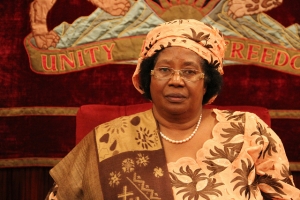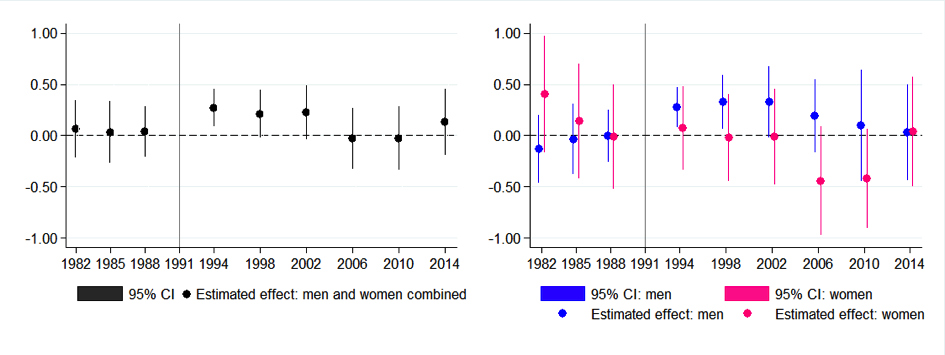When it comes to holding positions of authority, men tend to dominate. But what of the women who have broken through the glass ceiling? As the Above the Parapet project draws to a close, Purna Sen and Jade Cochran look at what those who have risen to positions of authority had to say about their journeys to seniority.
“…the relentless[ness] of it, the media scrutiny, some of the gender stuff, with all of it: I would still say it’s worth it. That what you get to do and achieve, if you’ve got a sense of purpose about policies, programmes, inequities, changes that you would want to see to your society – politics gives you the opportunity to do that in a way that no other walk of life does. And the delight which comes with being able to fix things that have raised your hackles and your anger for many long years is a very big delight.” Julia Gillard, former Prime Minister of Australia
The ability to influence is central to shaping the world in which we live. Whether that is to influence politics, policy, how people think and what they know or how states work together – all vital features of public life – it helps to have people in positions where their voices can be heard. Interest in who shapes public life has started to move from the number of men and women “in charge” to the impact of male dominance across public life. The profile of decision-makers shapes the understanding of the lives of citizens and the ability to respond appropriately to people’s needs. Recognition of the positives and relevance of equality in senior public life has paralleled the interest in barriers and talk of the glass ceiling.
While such concerns are absolutely warranted, what is as yet little understood is how women who seek seniority, with its corresponding ability to shape and influence public life, actually achieve this power. The Institute of Public Affairs’ Above the Parapet project sought to address this by studying the journeys of senior women in four fields: politics, diplomacy, academia and civil society.
Drawing on interviews with 80 women across the world, alongside the accounts of 5 visiting fellows, we have explored the pathways that have taken women from 48 different countries across 6 continents to the height of public life. Participants were asked about the challenges they faced and how they dealt with them, what reflections they have and what advice they would like to share with those who wish to follow. By deliberately reaching out to a variety of women leaders, including black and minority women, lesbians and women with disabilities, to share their accounts, we have also sought to identify how intersectionality – the way that socio-economic structures such as class, age and race interconnect – has played a role in accessing power.
All five Above the Parapet Visiting Fellows led the vanguard as “firsts” in their field. They were: Joyce Banda, first woman President of Malawi and first woman president in southern Africa; Roza Otunbayeva, first woman President of Kyrgyzstan and first woman president in Central Asia; Professor Sylvia Tamale, first woman Dean of a Law Faculty in Uganda and Africa; Julia Gillard, first woman to lead the Australian Labour Party and first woman Prime Minister of Australia; and Ruth Simmons, first African American person to head an Ivy League Institution, Brown University. Their experience is rich and deep; they provided valuable insights into how women have sought and shaped spaces to be heard and exercise influence.
Being the first entails many challenges, but, as many pointed out, fighting for new space is an essential part of creating a different world:
“There are numerous issues and challenges against which a serious female…has to stick her head above the parapet and face the first. Nevertheless, as we all know, walls develop cracks and it is those small gaps that provide women and other marginalised groups the opportunities to squeeze through the staid bricks and make their mark.” Professor Sylvia Tamale, first woman Dean of a Law Faculty in Uganda and Africa.
Our interest is both in the most cited challenges and in the breadth of challenges cited by interviewees – the latter is striking in the diversity of difficulties faced.
We found that only a minority had set specific career goals and made plans to achieve them. Most had done a variety of jobs and taken winding routes to seniority, building networks and experiences along the way. Academia was the one exception, although even here we found women who had taken less-defined career paths to reach their current position. As one academic stated: “It’s interesting in that my journey was very non-traditional, which is quite different from how most in academia make their journey or progress along the ladder… My journey was serendipitous, non-intentional; there was no career path or ladder that was a clear straight line. It was a series of opportunities presented to me that I wanted to pursue.”
The diversity of experience in journeys taken might account for the advice to grab every opportunity, which was echoed by many to whom we spoke. As one woman working in politics advised: “When you get an invitation to participate in something, you should never refuse it. These are always opportunities. You create yourself a network of people who are aware of your qualities and your qualifications.”
Perhaps because of this, another important quality that many shared was the ability to take risks and deal with uncertainty. Time and again, individuals spoke of the way they had to challenge perceived ideas on how and where women should contribute to society in order to achieve the positions they had.
It was no surprise that the challenge of dealing with sexism and sexist attitudes was raised with the most frequency. Three in five women we spoke to highlighted this as a problem. Many said they could not rely on equitable treatment and instead were prepared to highlight discrepancies when they found them.
One academic spoke of discovering that she was being paid less than her male colleagues, saying: “I came back [to work for the employer I had previously worked for] and was badly treated in one way, in that they decided they were going to pay me less than my colleagues. I discovered this…and was pretty miffed. It took me a while to challenge it, but I did. It’s all this business about, ‘I’m the best,’ and so I said, ‘Well, if I’m the best, then I expect to see that reflected’.”
Another common challenge, with over half of those interviewed mentioning this, was the reality of operating in a male-dominated environment – a feature of much of senior public life. Even at ambassador level this gender imbalance was remarked upon, with one ambassador describing her work at the United Nations as: “you go into the room and it’s just all men. If you talk about money, you go into that room, it’s all men. You go into the Security Council, the teams are practically all men. So the big hard-hitting issues? It’s men. Women are always given ‘the soft issues’.”
“You should be one hundred times better than men, better in education, better in knowledge. Otherwise they will never recognise you, never find you as an equal.” Roza Otunbayeva, former President of Kyrgyzstan
Male-dominated environments were, however, on occasion perceived as positive:
“On this journey, the lesson I have drawn is that I have received a lot of support from men, more than women. I do not remember when I was undermined by them. Particularly in the ministry, in government and with civil servants, I don’t remember anyone looking down on me. The negative attitudes and name calling came from outside the government system.” Joyce Banda, former President of Malawi

Issues related to diversity emerged as the third most frequently referenced challenge of those interviewed, with discriminatory attitudes and practices with regard to age, race, sexual orientation and disability also coming up as potential barriers to reaching seniority. From many diplomats being perceived as too young to represent their state on the international stage, to a sense of poor fit experienced by a black woman partnered with a white male mentor, the need to fight on many fronts and to have experience and potential fully recognised were felt keenly.
One black woman, for example, had been partnered with a white male mentor and spoke of how the differences between his life experiences and hers had hindered the mentoring process.
“They matched me with a mentor and it was a gentleman, a white guy, very knowledgeable, but it was just very difficult. Not the relationship, but my experiences were new to him. First as a woman and secondly as a black woman, so as much as he tried his best, he just…we couldn’t connect at that level and so I told him I needed to find another mentor who can… so when I said ‘this is happening’, she knows exactly what I’m talking about. It’s important to have people who can understand where you’re coming from.”
In contrast, some women’s experiences echoed what we were told by one politician:
“I’ve very often been the only person in a room who’s a woman or black and I learnt very early on that that was the reality that I couldn’t hide behind, that it was something that I should just embrace and use and to a certain extent promote. So I know that there’s discrimination against women and I’ve seen how discrimination can operate. I’ve experienced it myself, but at the same time I absolutely refuse to be a victim. There are things that you learn that help you negotiate that space and I have never approached any situation I’m in on the basis that because I’m a woman or because I’m a black woman I’m therefore going to be treated in a particular kind of way.”
Poverty and class also shape women’s opportunities and ability to forge paths, with expectations closely linked to social status. As one woman who worked in civil society said:
“I had to fight at school a lot because we lived on a council estate. My dad worked in a factory, my mum was dinner lady, and I was quite bright at school and, with three other girls in my year, had finished the syllabus a year early. [The school discussed] whether we should go up a year early, and our teacher said that there was no point because we all lived in council houses, we would all be pregnant at 15 anyway, our parents wouldn’t support us. So there was no point. What they decided to do was put us in the portacabin…with no teacher for a year and told us to build a scale model of the school.”
That women are under-represented in senior public life is well known. By shining a light on the experiences of those who have risen to positions of authority, Above the Parapet aims to deepen our understanding of what it may take to open up access to leadership and encourage more women to positions of influence. A final report will be published in 2016.
Profile: Ruth Simmons
Professor Ruth Simmons was the fifth and final Above the Parapet visiting fellow. The last of 12 children born into poverty to a Texan sharecropping family during a time of rigid racial segregation, she became the 18th president of Brown University, and the first black president of an Ivy League institute.
“I grew up with modest goals. I wanted an opportunity to not become a maid like everybody else around me, and yet I’ve traversed this chasm. By the time I began my career I thought I was already at the height of my achievement; to advance from a segregated inner-city high school to a PhD at Harvard was beyond what I or my teachers or parents could have imagined.
“It was never a conscious decision to be an administrator. I saw myself as a professor. But I was teaching French literature and I noticed something pretty important: I realised there were no minorities in my classes. I was one of very few African Americans on the faculty, yet I was not encountering any minority students. I wanted to do something to help students like me, and what if I don’t encounter them because of the esoteric field in which I was teaching? So that prompted me to take an administration position as I would then encounter and be in a position to help minority students.
“When I was approached about becoming the President of Brown, the opportunity to ‘break the colour line’ in the Ivy League was ultimately something I couldn’t say no to. I was persuaded by some who thought that symbolically this was such an important thing to do.
“As the first black president of an Ivy League university I was aware that many would be concerned about my ascension into that post; that I would not have the freedom of some of my fellow presidents in the Ivy League to govern. I, along with two other female Ivy League presidents, would be greeted by watchful stakeholders.
“When I began my presidency, I hoped my race and gender would not be an issue. We have this fantasy: if we only we didn’t have to operate in these circumstances we could achieve marvellous things. An erasure of my unique circumstances – that is to say the racism that shaped my early life, the constraints of poverty, unequal pay when I became an academic – all these factors enabled me to see the presidency from a very particular perspective.
“The ubiquitous stereotyping that besets us as human beings is a factor that women, minorities and many others will endure for a long time to come. Fighting those often oppressive stereotypes should never prevent us from fighting the right problems and addressing the right issues. I am relieved I did not have the ability to ignore my race and gender, for doing so improved my leadership, strengthened my confidence and made a difference for my administration of the university.”
Jade Cochran was Project Adviser and Researcher. Darja Schildknecht, Project Officer, provided research support. Dr Purna Sen, former Deputy Director of the Institute of Public Affairs (and current Director of Policy at UN Women), led the Above the Parapet study. Above the Parapet received financial support from the LSE Annual Fund and the Alison Wetherfield Foundation. The report will be launched in 2016. Extracts from some interviews can be seen online at the LSE Above the Parapet Facewall.
This article first appeared in LSE Connect, volume 27, number 2, winter 2015 issue. It is being republished with approval from the authors.





